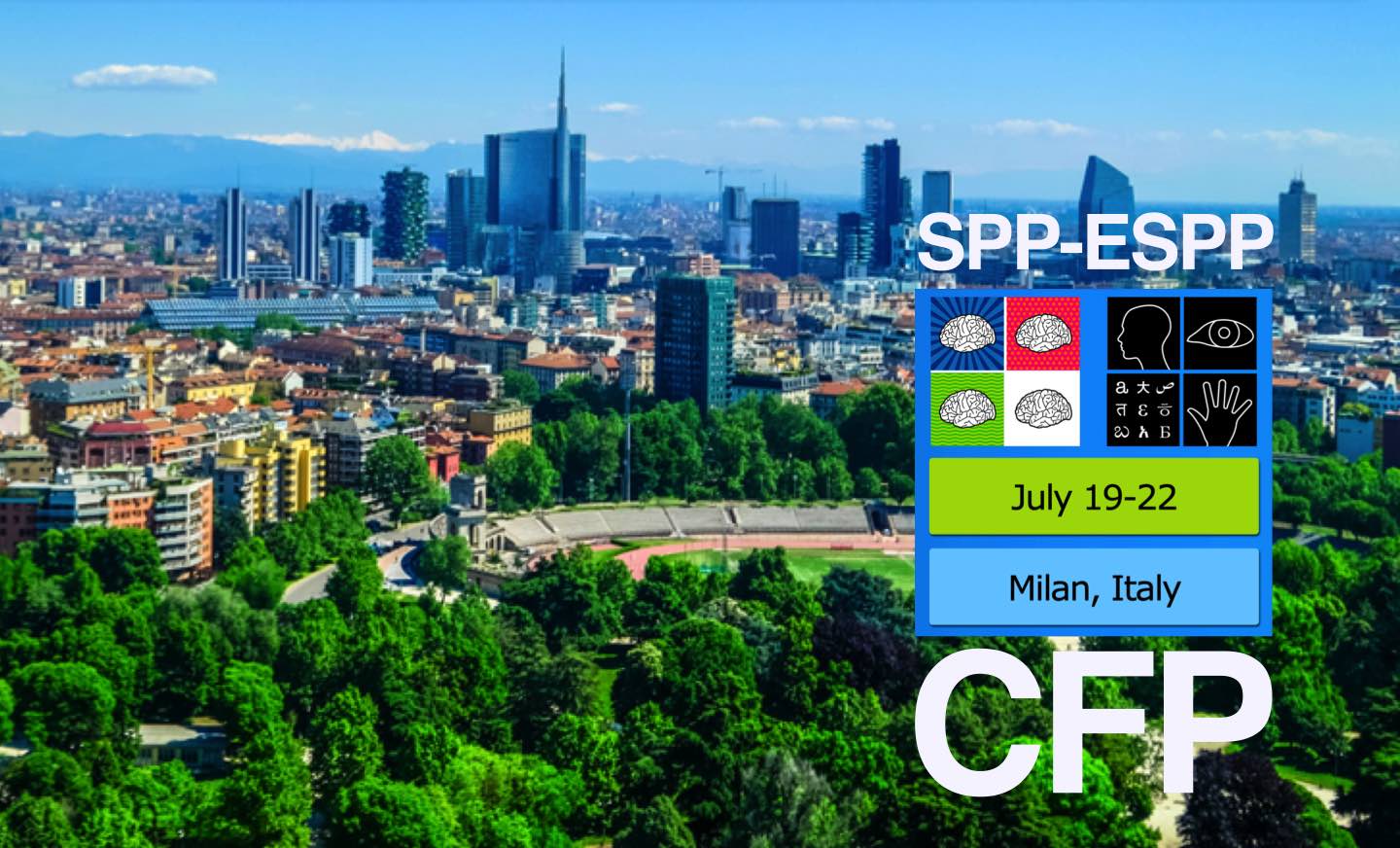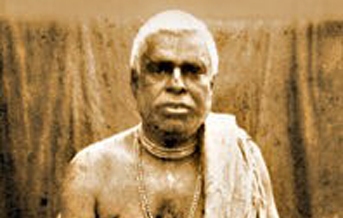
Submissions may take one of two formats: (1) a paper not to exceed 8 double-spaced pages; (2) an abstract not to exceed 2 double-spaced pages. Some may find that Format 1 better suits philosophy submissions and Format 2 better suits psychology/linguistics submissions. However, we welcome submissions from any field or approach in either of the two formats. Submissions will be refereed and selected on the basis of quality and relevance to psychologists, philosophers, and linguists. Note: A speaker may submit at most one single-authored paper. However, a speaker may additionally be part of one submitted symposium proposal or one jointly authored submission.
19-22 July 2022
University of Milan
Submission deadline: 20 February, 2022
The SPP is among the premier organizations of its kind in the world. SPP was founded in 1974 to provide a forum for exchanging ideas on the very latest empirical and philosophical approaches to the mind. The name of the Society signals the traditional liaison between philosophy and psychology, but our interests extend well beyond these fields. Our membership also includes scholars from linguistics, neuroscience, evolutionary biology, cognitive anthropology, artificial intelligence, psychopathology, and cognitive ethology. Some of the most important and well-known research themes in the cognitive sciences were discussed in their nascent stages at the Society’s annual meeting. These meetings are lively and collegial, and present an unrivalled opportunity for intellectually stimulating conversations that cross traditional academic boundaries. The Society takes special pride in creating a supportive atmosphere for researchers in the early stages of their careers, including graduate students. Many of them have gone on to become prominent contributors to their fields and to the present life of the Society.
If you have questions, you may contact the Head Program Chairs, Shannon Spaulding and Adrian Alsmith, or email philpsych2022[at]gmail.com.
Paper submissions
Please use the online submission form to be found at: easychair.org/conferences/?conf=sppespp2022.
Symposium submissions
Hakwan Lau (Riken Center for Brain Science)
In addition, there will be a keynote address from the Stanton Prize winner, a young scholar in philosophy or psychology who has begun making significant contributions to interdisciplinary research and has been active in SPP.
Poster submissions
Elisabeth Pacherie (Institut Jean Nicod) – ESPP Presidential Address
Keynotes
History: At the 1996 annual Business Meeting, SPP membership moved to create an award for graduate student papers accepted for oral presentation in contributed sessions at subsequent annual meetings. The SPP funds up to two awards yearly, with no more than one award per discipline. Awards are €250 paid out of SPP funds, and a certificate. The yearly panel of judges includes the Program Co-Chairs and the President, as well as any other willing SPP officers, executive committee members, or regular members requested by this group. Having a paper accepted for oral presentation in a contributed session alone is not sufficient for receiving an award. At the 1997 meeting, membership moved to rename the award The William James Prize, in light of James’ contributions to both philosophy and psychology. Information on past winners is available on the SPP website.
From the SPP:
Adrian Alsmith, Philosophy Program Chair (adrian.alsmith@kcl.ac.uk) Eva Rafetseder, Psychology Program Chair (eva.rafetseder@stir.ac.uk) Maria Spychalska, Linguistics Program Chair (m.spychalska@gmail.com)
The aim of the European Society for Philosophy & Psychology is ‘to promote interaction between philosophers and psychologists on issues of common concern’. Psychologists, neuroscientists, linguists, computer scientists and biologists are encouraged to report experimental, theoretical and clinical work that they judge to have philosophical significance; and philosophers are encouraged to engage with the fundamental issues addressed by and arising out of such work. In recent years ESPP sessions have covered such topics as theory of mind, attention, reference, problems of consciousness, introspection and self-report, emotion, perception, early numerical cognition, spatial concepts, infants’ understanding of intentionality, memory and time, motor imagery, counterfactuals, the semantics/pragmatics distinction, comparative cognition, minimalism in linguistic theory, reasoning, vagueness, mental causation, action and agency, thought without language, externalism, hypnosis, and the interpretation of neuropsychological results.
[Printer-friendly version]
The 2022 Stanton Prize
The 3rd Joint Conference of the Society for Philosophy and Psychology and European Society for Philosophy and Psychology invite submissions of papers, symposia and posters for the 3rd joint meeting of the SPP and ESPP, to be held 19-22 July 2022 in Milan Italy. See the call for papers, symposia, and posters below.
The 2022 William James Prize
From the ESPP:
The Societies also encourage joint submission of papers as symposia topics. Submissions from PhD students and postdocs are especially encouraged. Symposium proposals must include the following three elements in a single document. (1) A list of 3 to 4 speakers which includes speakers from at least two disciplines (individual speakers may also represent multiple disciplines). (2) A general abstract, laying out the topics to be addressed and indicating connections among the talks (3) Individual abstracts for each talk.
- To be eligible for the William James Prize, one must be pursuing a doctoral degree in philosophy, psychology, or other relevant disciplines, and must not have received the Ph.D. by the submission deadline for contributed papers. This year’s submission deadline is February 20, 2022.
- The William James Prize committee will determine the prize-winners (if any) only after the program decisions have been made.
- Prize-winners will be acknowledged by a special insert in the conference program and will receive their check and certificate at the annual Presidential Address and Banquet.
- The author(s) of the winning paper(s) will have the option to publish a version of their paper, revised in light of the conference discussion, in the journal Philosophical Psychology.
- Please indicate your interest in being considered for the 2022 William James Prize in a cover letter accompanying your submission.
- Your submission should follow the guidelines outlined in the general call for papers. Please bring the SPP William James award to the attention of your graduate students
Covid-19
There will also be poster presentations. A submission for a poster presentation should consist of an abstract not to exceed 2 double-spaced pages. Submitted papers may also be considered for presentation as posters. A €100 prize will be awarded for the best poster at the meeting.
Program Committee
Rules for Submission:
Stanton Prize Lecture (see below)
Shannon Spaulding, Philosophy Program Chair (shannon.spaulding@okstate.edu) Roman Feiman, Linguistics Program Chair (roman_feiman@brown.edu) Chaz Firestone, Psychology Program Chair (chaz@jhu.edu)
The 3rd Joint Meeting is organized by the following representatives
Any paper considered as part of a submitted symposium will also be considered for an independent paper presentation, in the event that the symposium of which it is a part is rejected.
We are planning for this to be an in-person conference. We will monitor the situation with respect to case numbers, travel restrictions, local mitigation strategies and decide early in 2022 whether to continue with an in-person conference or pursue a different arrangement (e.g., online or postponement).
About the Societies
Steven Gross (Johns Hopkins) – SPP Presidential Address
Kathryn Davidson (Harvard)
